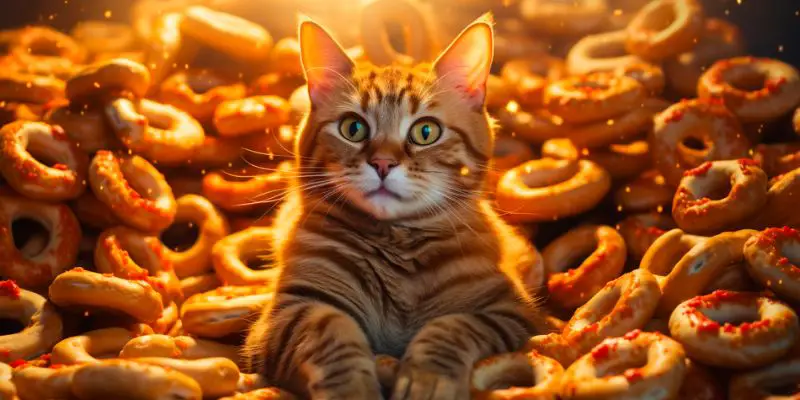Introduction
Cats, those enigmatic companions, have dietary needs as unique as their personalities. In this exploration of feline nutrition, we’ll dive into the intricacies of what cats should consume and the burning question: Can Cats Eat Pretzels?

Understanding Cat Nutrition
Unlocking the mysteries of can cats eat pretzels?. We’ll scrutinize the pivotal role of protein in their diet and the potential hazards lurking when we share our human snacks with them.
Can Cats Eat Pretzels?
Pretzels, with their tempting aroma and satisfying crunch, might seem harmless, but are they safe for our feline friends? We’ll journey through the ingredients in pretzels and uncover the potential risks associated with sharing this beloved snack.
Nutritional Facts of Pretzels
Beyond the taste, delving into the nutritional content of pretzels is crucial. From the caloric content that contributes to their flavor to the sodium levels that may pose a threat, we’ll dissect why pretzels lack the essential nutrients for cats.

Potential Health Risks
Feeding pretzels to cats could lead to various health issues, including digestive problems, salt poisoning, and concerns related to obesity. It’s vital to comprehend these risks to make informed decisions about your cat’s well-being.
Signs of Allergic Reactions
Just like humans, cats can be allergic to certain foods. Learn to recognize the signs of allergic reactions and understand the immediate actions to take if your cat exhibits any adverse symptoms.
Alternatives to Pretzels
Rather than tempting fate with pretzels, explore healthier alternatives. From cat-friendly treats to homemade snacks crafted with care, discover options that align with your feline friend’s nutritional needs.

Feeding Guidelines for Cats
Navigate the labyrinth of proper feeding guidelines, from the importance of portion control to creating a balanced diet. We’ll underscore the necessity of consulting with a veterinarian for personalized advice tailored to your cat’s unique requirements.
Addressing Common Misconceptions
Let’s debunk myths surrounding cats and human food, emphasizing the importance of thorough research before introducing new foods into your cat’s diet.
Cat-Friendly Snack Ideas
Offer your cat treats that not only delight their taste buds but also contribute to their overall well-being. Explore a list of cat-friendly snacks and precautions to take when introducing new treats into their diet.
Conclusion
In wrapping up this culinary journey through feline nutrition and pretzel ponderings, remember that responsible pet ownership extends to mindful feeding. Understanding the nutritional facts and potential risks empowers you to make choices that prioritize your cat’s health.
FAQS
Cats can enjoy a variety of treats, but it’s crucial to choose wisely. Opt for lean meat treats like cooked chicken or turkey, providing a protein-packed delight. Catnip is another feline favorite, inducing playful antics without harm. Commercial treats are available, with options that prioritize high protein and minimal additives. However, it’s vital to avoid toxic foods like chocolate and onions, as well as scrutinize treat labels for harmful ingredients. Moderation is key; while treats can be delightful, a balanced diet remains essential for a cat’s overall health and well-being.
Foods Cats Can Eat:
Cats can safely enjoy lean meats like chicken and turkey, catnip in moderation for playful moments, and commercial cat treats designed with high protein and minimal additives. Occasional treats like fish and cooked eggs can also be included for variety.
Foods Cats Should Avoid:
It’s crucial to keep cats away from toxic foods such as chocolate, onions, garlic, and caffeine. Additionally, bones, excessive dairy, highly processed foods, and substances like alcohol and caffeine can pose health risks to our feline friends. Always prioritize a balanced and vet-approved diet for your cat’s well-being.
2 thoughts on “Can Cats Eat Pretzels? Nutritional Facts 2023”